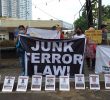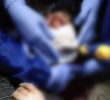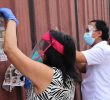DAVAO CITY, Philippines – The Catholic Bishops Conference of the Philippines (CBCP) issued a strong pastoral letter and call to prayer Sunday on their concern on human rights in the Philippines highlighted by the signing of the Anti-Terrorism Act.
The Pastoral Letter, signed on July 16 by its acting president Caloocan Bishop Virgilio David, said they are in “disbelief” on how the anti-terror law was fast-tracked and approved by the Senate and the House while the country is still reeling from the Covid-19 pandemic and ignored the broad criticisms on this law.
“The dissenting voices were strong but they remained unheeded,” the CBCP said, believing that “political pressure from above seemed to weigh more heavily on our legislators than the voices from below.”
David said efforts from the proponents of the law to dismiss the Filipinos’ fear of abuse runs contrary to the human rights issues that has happened under Duterte’s administration.
“Have we not heard of people active in social advocacies who are accused of being communists? Have we forgotten the bishops, priests and religious who were included among those falsely charged by the Philippine National Police with crimes of sedition and inciting to sedition?” the bishop said.
He also raised concern on the killings of thousands in the government’s war against drugs, and the persecution of Senator Leila de Lima. He also noted the “chilling effect” of the closure of broadcast network ABS-CBN through the House of Representatives that has been pro-administration. ”Is it not evident to us how this pattern of intimidation creates an atmosphere detrimental to the freedom of expression in our country?” David asked.
CBCP said the passage of the Anti-Terror Law also coincided with Hong Kong’s passage of the National Security Act, and that Cardinal Charles Maung Bo, President of the Federation of Asian Bishops’ Conferences, called for prayers for the people of Hong Kong.
“The assurance that they give sounds strangely parallel to that which the Chinese government gave to the people of Hongkong: ‘Activism is not terrorism. You have no reason to be afraid if you are not terrorists.’ We know full well that it is one thing to be actually involved in a crime and another thing to be merely suspected or accused of committing a crime,” they said.
CBCP raised concerns as to how the Supreme Court will vote on several petitions from rights advocates to question the legality of the Anti-Terror Law. “Will the highest level of our Judiciary assert its independence, or will they, too, succumb to political pressure?”
“While a semblance of democracy is still in place and our democratic institutions somehow continue to function, we are already like the proverbial frog swimming in a pot of slowly boiling water,” the bishops warned.
The bishops ended the statement with a call to prayer, and commended some government agencies and officials who are functioning to serve their constituents.
“They are an important element to the strengthening of our government institutions, and are an essential key to a stable and functional democratic system,” the CBCP said.
Bishop David assumed the position of acting president after its head Bishop Romulo Valles from the Archdiocese of Davao suffered a stroke last May. (davaotoday.com)










